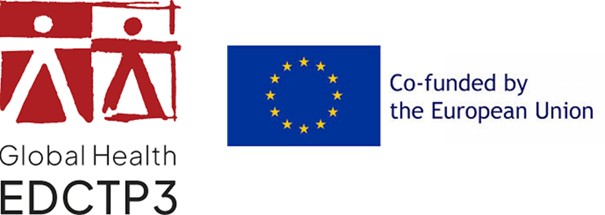Malaria
Malaria Vaccine
Malaria still causes over 600,000 deaths worldwide, annually, with children under the age of five years accounting for approximately 90% of all malaria deaths in sub-Saharan Africa.
Recent advances in malaria vaccine development have opened a new era in the fight against malaria with the recommendation by the World Health Organization (WHO) for two malaria vaccines: RTS,S/AS01 and R21/Matrix-M in 2021 and 2023, respectively.
Both malaria vaccines have similar schedules, with a 3-dose primary series and at least 1 booster dose approximately 12 months after completing the primary series. There is evidence that the current routine malaria vaccine schedule, with some doses not aligned with the timing of other routine vaccines, may limit the achievement of high malaria vaccine coverage among the target population.
The R21/Matrix-M (R21-MM) is highly effective, safe and well tolerated in children. however, the WHO-recommended delivery strategy for this vaccine, as adopted by many countries in the Sahel region and based on the Essential Programme on Immunization (EPI), may not be the optimal strategy in seasonal malaria transmission settings, characteristic of this Sub-Saharan Africa area.
Indeed, the complexity of the malaria vaccine schedule, with one or more doses currently outside the routine EPI schedule of many countries, raises many questions about the best strategy for vaccine implementation.
Our hypothesis is that in a context of seasonal transmission, the combination with Seasonal Malaria Chemoprevention (SMC) will be more effective than an age-based strategy (EPI). However, as there is no robust evidence to support this hypothesis, we will investigate several strategies to clarify which is optimal in reducing the burden of this devastating disease.
Two-arm, multi-disciplinary Phase IV cluster-randomized non-inferiority trials will be conducted, one in Burkina Faso and Mali (called IMVACS), and one in Chad (called CoSAV-R21) to evaluate the effectiveness and real-life impact of the proposed strategy among children aged 5-36 months, comparing R21-MM vaccination synchronised with SMC to R21-MM vaccination following an age-based strategy integrated within routine EPI services.
CoSAV-R21 | Chad
Comparison of two strategies for administering the R21-Matrix M vaccine in a context of seasonal malaria transmission
Main objective
To assess whether the R21-MM vaccine synchronized with SMC is non-inferior to R21-MM administered as part of routine EPI in preventing malaria in children aged 6-11 months at time of first dose R21-MM in the Dembo and Moïssala health districts.
Secondary objectives
To evaluate the impact of R21-MM synchronized with SMC compared to R21MM administered as part of routine EPI in preventing malaria in children age-eligible at the first dose of R21/MM, in the Dembo and Moïssala health districts.
To evaluate the impact of R21-MM synchronized with SMC compared to R21-MM administered as part of routine EPI in preventing malaria in children aged 6-59 months, in the Dembo and Moïssala health districts
R21/MM vaccine coverage
To estimate and compare R21/MM vaccination coverage in each arm of the study.
To estimate and compare R21/MM drop-out rates between dose 1 and dose 3 and between dose 3 and dose 4 (booster) in each study arm.
To describe the reasons for R21/MM non-vaccination among children eligible for R21/MM vaccination in each arm of the study.
Impact of R21/MM implementation strategies on other malaria prevention measures
To estimate and compare SMC coverage in each arm of the study.
To estimate and compare the coverage and use of long-lasting insecticidal nets (LLIN) in each arm of the study.
To estimate and compare the coverage of other vaccine antigens administered as part of the EPI at 9 and 15 months of age (measles 1, measles 2) in each arm of the study.
To compare the coverage of other preventive measures (SMC, LLIN, other vaccine antigens) according to the child's place of residence (<5 km vs. ≥5 km from the nearest health facility).
Protective efficacy of R21-MM against severe malaria
To estimate the individual protective efficacy of R21/MM against confirmed severe malaria, using a case-control study
Impact of R21-MM in reducing all-cause morbidity
To compare the proportion of all-cause morbidity registered at health centres attributed to uncomplicated malaria among children aged 6-59 months in each arm of the study.
R21-MM safety
To describe the occurrence of serious adverse events (SAE), adverse events following immunization (AEFI) and adverse events of special interest (AESI) after vaccination with the R21/MM vaccine in each arm of the study, using Chad's current surveillance system, MAPI, for reporting SAEs, AEFIs and AESIs.
Note: A separate protocol (INTEGREVAC study) will leverage the CoSAV-R21 study to include objectives of evaluating R21-MM acceptability, operational feasibility, cost and cost-effectiveness of the two R21-MM implementation strategies:
Assess the acceptability and operational feasibility of each strategy among policy makers, health officials, health care providers, parents/guardians of children eligible for malaria vaccination; Explore among parents/guardians and health care staff the reasons for non-adherence or partial adherence to malaria vaccination; Describe the impact of each vaccination strategy on other malaria prevention practices.
Evaluate the implementation of each strategy (process evaluation) and the contextual, structural/health systems, socio-cultural and behavioural factors influencing their adoption and use
Evaluate the cost and cost-effectiveness of strategies: marginal costs (per child vaccinated), modelling of the clinical impact of each vaccine strategy, and cost-effectiveness ratio (per case of malaria and per disability-adjusted life year [DALY] averted) of each vaccination strategy
Country
Chad
Status
Launch of the study (June 2025)
Tentative end Date
2028
Our role
Study Coordination, trial sponsorship, data management and analysis, training and capacity building
Partners
Chad Ministry of Public Health and Prevention (MSPP)
Liverpool School of Tropical Medicine, Liverpool, United Kingdom
Sponsor
MSF (TIC (Transformational Investment Capacity) funding)
For more information, contact
IMVACS | Burkina Faso and Mali
INTEGRATING MALARIA VACCINE WITH SEASONAL MALARIA CHEMOPREVENTION IN WEST AFRICA
Primary Objective
To evaluate whether, compared to Routine EPI vaccination, R21-MM integrated SMC vaccination has a noninferior efficacy, defined as incidence of malaria among children aged 5-36 months living in Burkina Faso and Mali over 12 months after the administration of the first dose
Secondary Objectives
1. To evaluate the impact of the integrated SMC vaccination compared to Routine EPI Vaccination, on the incidence of malaria among children aged 5-36 months over 24 and 36 months after the administration of the first dose;
2. To evaluate the impact of the Integrated SMC Vaccination compared to routine EPI vaccination on the incidence of malaria among children aged 3-59 months over 12, 24 and 36 months after the administration of the first dose;
3. To evaluate the impact of the Integrated SMC Vaccination compared to routine EPI vaccination on the prevalence of malaria infection at peak transmission in November after SMC campaigns in 2025 and 2026;
4. To compare vaccine coverage (overall number of doses, dropout from dose 1 to 3, dropout from dose 3 to 4), reasons for non-vaccination, long-lasting insecticide-treated bed net use, SMC coverage, and EPI coverage between study arms;
5. To describe the post-licensure safety profile of R21/MM;
6. To assess the acceptability of each vaccination strategy among policy makers, health managers, health providers and caregivers;
7. To assess the feasibility of each vaccination strategy among policy makers, health managers and health providers;
8. To identify the contextual and behavioral factors impeding or facilitating R21/MM vaccine uptake in each vaccination strategy and to explore the effects of R21/MM introduction on EPI vaccination perceptions and practices;
9. To identify the factors that enhance and/or constrain the successful completion of four doses of R21/MM and the key drivers of vaccination coverage, and how these change over time;
10. To measure incremental costs (per child vaccinated) and cost-effectiveness (per malaria case and separately, per Disability-adjusted life years (DALY) averted) of each vaccination strategy, and to explore cost drivers and the budget impact of each approach in both countries.
to find out more and follow the project https://www.imvacs.org/fr/informazioni/
Country
Mali, Burkina Faso
Status
Launch of the study
Tentative end Date
2028
Our role
Trial sponsorhip, data management and analysis, training and capacity building
Partners
- MOH
- Institut de Recherche en Sciences de la Santé, Direction Régionale du Centre-Ouest (IRSS-DRCO), Unité de Recherche Clinique de Nanoro (URCN),
- University of Sciences Techniques and Technologies of Bamako
- R-Evolution Worldwide
- Liverpool School of Tropical Medicine, Liverpool, United Kingdom
Sponsor
The 4-year IMVACS project, which runs from 1st December 2024 to 30th November 2028, is supported by the European and Developing Countries Clinical Trials Partnership (Global Health EDCTP3) and the European Union.











